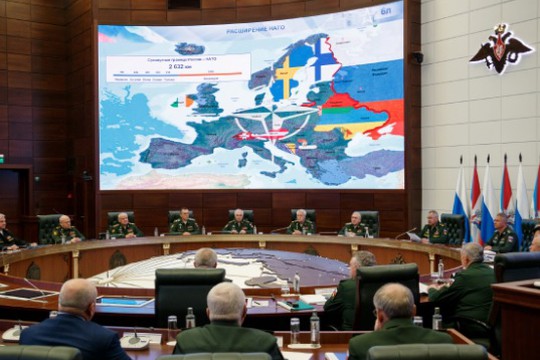Photo: Russian MoD
Introductory speech of Russian Defence Minister Sergey Shoigu at Defence Ministry Board session August 8:
“On today’s Board session we will address issues of establishing Leningrad and Moscow military districts, as well as strengthening the grouping of forces of the Armed Forces of the Russian Federation on our western boarders.
The 'collective West' is waging an indirect war against Russia by providing unprecedented support to the puppet regime in Kiev.
Since February last year, Ukraine has received hundreds of tanks, more than four thousand armoured fighting vehicles and armoured motor vehicles, over one thousand one hundred field artillery pieces, as well as dozens of modern multiple-launch rocket systems and anti-aircraft missile systems of Western manufacture. The total amount of assistance from NATO, the European Union and their partners exceeded 160 billion dollars.
At the same time, the United States is steadily raising the stakes, seeking from its allies deliveries of increasingly long-range and deadly weapons.
In May, British long-range Storm Shadow air-launched guided missiles were transferred to Ukraine.
Given the growing shortage of ammunition for Western-manufactured artillery systems in the AFU, Washington has committed a war crime by including cluster munitions, which are prohibited by international convention, in the aid package.
In addition, NATO countries are actively considering the transfer of F-16 tactical fighter jets to Kiev.
The West's willingness to invest a significant portion of available resources in Ukraine in order to turn the situation on the battlefield in its favour creates serious risks of further escalation of the conflict.
Threats to the military security of the Russian Federation have multiplied in the western and north-western strategic directions.
A serious destabilising factor is the accession of Finland and, in the long term, Sweden to NATO.
After Helsinki joined the alliance, Russia's land border with the NATO countries almost doubled.
Additional NATO military contingents and strike weapons are likely to be deployed on Finnish territory, capable of striking critical facilities in northwestern Russia at considerable depth.
Existing risks are related to the militarisation of Poland, which has become the main instrument of the United States' anti-Russian policy. Warsaw has announced its intention to build, as the Polish claim, 'the most powerful army on the continent'.
In this regard, large-scale purchases of weapons from the United States of America, the United Kingdom and the Republic of Korea, including tanks, artillery systems, air defence and missile defence systems and combat aircraft, have been initiated.
In addition, there are plans to establish, on a regular basis, a so-called Polish-Ukrainian formation, ostensibly to ensure the security of western Ukraine, but in fact for the subsequent occupation of that territory.
Taking into account the armed forces of the Eastern European countries, about three hundred and sixty thousand military personnel, eight thousand armoured vehicles, six thousand artillery systems and mortars, six hundred and fifty aircraft and helicopters are deployed in the immediate vicinity of the borders of the Union State.
The number of formations of extra-regional states of the North Atlantic alliance has increased 2.5 times since last February and exceeded 30 thousand people.
These threats to Russia's military security require a timely and adequate response. We will discuss the necessary measures to neutralise them at the meeting and take appropriate decisions”.
read more in our Telegram-channel https://t.me/The_International_Affairs

 9:17 12.08.2023 •
9:17 12.08.2023 •























